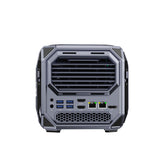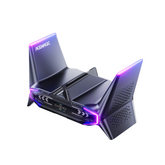Why Is Your Internet So Slow? 10 Common Causes and Fixes
There's nothing more frustrating than trying to stream your favorite show, join a Zoom meeting, or simply browse the web—only to be met with painfully slow internet speeds. If you've ever sat there wondering, "Why is my internet so slow?" you're definitely not alone. Whether it's buffering videos, lagging games, or pages that refuse to load, slow internet is a universal headache.
But don't reach so fast for the email of a new internet provider or toss your router out the window just yet. Lots of factors could be contributing to your sluggish connection. From simple hardware limitations to complex network issues, determining the root cause is the start of a sleek, smooth, super-speedy web experience. In this article, we're going to break down the 10 most common reasons your internet is slow—and better yet, how to fix each one.
Cause 1: Weak Wi-Fi Signal Strength
One of the most common culprits behind a sluggish internet connection is a weak Wi-Fi signal. When your device is far from the router or surrounded by thick walls, signals can weaken or get completely blocked. This degradation results in slower speeds, dropped connections, and frustrating lag.
The placement of your router matters significantly; sticking it in a corner or basement is not ideal. To perform optimally, your router has to be located in an open, central, elevated position so as to broadcast the signal evenly. Remember that other electronic devices like cordless phones and microwaves will also interfere with your signal if they are close to it.
How to fix it:
- Place your router in an open, central area.
- For big houses, use a Wi-Fi range extender.
- Minimize physical obstructions like metal surfaces or heavy walls.
- Switch to a less congested frequency band, e.g., 5GHz rather than 2.4GHz.
- Upgrade to a newer Wi-Fi 6 or Wi-Fi 6E-enabled router for higher data rates and better performance in crowded network scenarios.
Cause 2: Old Router or Modem
If you are still using the same device your internet service provider (ISP) gave you years ago, it could be dragging down your internet. Older equipment usually doesn't support modern speed demands, and that results in poor performance on a high-speed plan. Routers and modems have a shelf life of about 5 to 7 years. After that, they might not be able to support the most current, faster technology like Wi-Fi 6 or DOCSIS 3.1.
How to fix:
- Check the model and features of your current router and modem.
- Cross-check what your device can perform with your current internet plan.
- Think about buying a new device that supports gigabit speeds and Wi-Fi 6 or later.
- If you rent equipment, reach out to your ISP for potential upgrades.
Cause 3: Rush-Hour Network Overload
If you notice your internet crawls around evening hours, you're likely viewing network congestion. Similar to traffic congestion on the road, your internet gets congested if too many individuals in your neighborhood are using the internet simultaneously, typically between 6 p.m. and 11 p.m. This is especially common in urban areas where many homes share the same ISP infrastructure.
How to fix it:
- Plan big downloads or system upgrades during late evening or early morning hours.
- Connect via a wired Ethernet cable for a more reliable and prioritized connection.
- Activate Quality of Service (QoS) settings in your router to give priority to vital traffic (such as video calls).
- Contact your ISP to see if they have a higher-tier plan or an upgrade to fiber available for your location.
Cause 4: Too Many Devices Connected
In a typical home today, there are dozens of devices on Wi-Fi, ranging from laptops and smartphones to smart TVs and security cameras. The convenience brings heavy bandwidth competition. Each device consumes part of your internet bandwidth, and the more devices are engaged in high-demand activities simultaneously (such as gaming or streaming), the lower your total speed.
How to fix it:
- Check your router's admin dashboard and log in to find out the number of devices that are connected.
- Remove any idle or unused devices from your network.
- Utilize dual-band or tri-band routers to distribute traffic across multiple frequency bands.
- If your family has high usage demands, upgrade your internet plan.
Cause 5: Background Applications and Updates
At times, your slowdown is not your network's fault but yours. Many programs and system processes are running in the background, quietly consuming bandwidth to download updates, sync files to the cloud, or autoload videos. Cloud services such as Google Drive or Dropbox, automatic Windows or software updates, and streaming websites with an open browser tab are typical offenders.
How to fix it:
- Monitor which background tasks are using your network with Task Manager (Windows) or Activity Monitor (Mac).
- Prevent automatic updates from taking place during work hours.
- Close unnecessary browser windows and applications.
- Set cloud backups to occur manually or outside of peak times.
Cause 6: ISP Throttling
Your internet may be slow because your Internet Service Provider (ISP) is slowing down your connection as a matter of policy, a process known as throttling.
This may occur if you utilize more than a monthly data allocation, utilize data-heavy activities, or at times of high network utilization, as a method of managing the ISP's network traffic on behalf of the ISP. A good method of checking this is by first performing a speed test, then performing another speed test while accessing with a Virtual Private Network (VPN). If your speed is significantly faster with the VPN, it's a reliable sign that your ISP is throttling your connection.
How to fix it:
- Using a quality VPN may bypass these throttling constraints.
- Call your provider and ask about data limits on your plan.
- Switch to a more premium plan with fewer restrictions or change to a less oppressive ISP.
Cause 7: DNS Server Issues
The Domain Name System (DNS) is the Internet's telephone book. It takes the address of the site you're trying to type (like www.google.com) to a numeric IP address, which your computer is familiar with. We all use the default DNS servers provided by our ISP, which are not always the fastest. If you're using a slow DNS server, you'll experience a lag before a site even begins to load, so it will seem like your entire internet connection is slow.
How to fix it:
- Switch to a free third-party DNS service like Google DNS or Cloudflare. This is a simple settings change on your router or computer that can significantly speed up your browsing.
Cause 8: Malware or Viruses
Malware on your machine can do more than steal your data; it can bog down your internet. Malware, spyware, and viruses can execute hidden background processes that consume enormous bandwidth by transmitting data or talking to malicious servers. This can result in unnecessary data usage and continuous buffering.
How to fix it:
- Use regular, full-system virus scans with up-to-date security software.
- Keep your firewall on your computer turned on.
- Steer clear of unfamiliar downloads and ensure your software is current to plug security vulnerabilities.
Cause 9: Data Cap Limitations
Most online plans, particularly mobile and low-cost plans, include an internet data limit per month. Once you exceed that, your ISP may cut your speed way down automatically. The throttling can be sneaky, as all of a sudden, your connection would go from running great to a halt. Most users don't know they have an internet data limit until they get slowed down.
How to fix it:
- Monitor your data use regularly through your ISP's website or mobile app.
- Look at what activities, like high-def streaming or cloud backup, consume the most data.
- If you continue to exceed, change to a higher-limit plan or, ideally, no limit at all.
Cause 10: Device Limitations (Old Software/Hardware)
Even with a great internet plan and a new router, the bottleneck could be your device itself. Older computers, tablets, or smartphones just don't have the latest hardware required to keep up with high-speed connections. For instance, a laptop that only has an older Wi-Fi standard like Wi-Fi 4 won't be able to make the most of a new Wi-Fi 6 router.
How to fix it:
- Test your internet speed on a newer device. If it is significantly faster, then the problem is with your old device.
- Ensure your device's operating system and apps are updated fully.
- Clear your browser cache periodically and optimize your apps to make them more efficient.
- At times, it is time to acquire a newer device that can keep up with the internet demands of today.

How to Properly Test Internet Speed
If your connection is slow, a proper speed test is the first step to resolving the problem. A proper test checks three significant items:
- Download Speed: How fast data gets downloaded from the internet to your machine.
- Upload Speed: How fast data gets uploaded from your machine to the internet.
- Latency (Ping): The time it takes for a signal to travel from your device to a server and back.
To get the best results, plug your computer directly into your router using an Ethernet cable. This bypasses any issues with your Wi-Fi and gives you a real baseline measurement of your network speed. Next, ensure that no other computers or devices are hitting the internet hard while the test is being run. If your results are always lower than your plan promises, this could be a sign of congestion, an issue with your service, or a need for an equipment upgrade.
Guru Hacks for Maximum Internet Speed
It is simple to repair slow internet, but habits will make sure it remains that way. These are some guru tricks for a healthily maintained connection:
- Reboot Your Devices Periodically: Your router and modem can be rebooted with one reboot per month, which can release memory and correct small bugs slowing down the internet.
- Maximize Router Placement: Never put your router in a cabinet or corner. Place it at a central high location to achieve the best possible signal reception throughout all the rooms in your home.
- Update Firmware: The manufacturers release firmware updates to improve router performance and security. Check for updates from your router manufacturer's website or enable automatic updates if the feature is available.
- Lock Down Your Network: Use a secure, unique WPA2 or WPA3 password for your Wi-Fi. This prevents neighbors or intruders from tapping into your network and sharing your bandwidth.
- Control Your Devices: Periodically scan to find which devices are using your network and log off any that you no longer use. Additionally, control background applications on your primary machines so that they will not be bandwidth guzzlers.
- Employ a Wired Connection for Critical Devices: For fixed devices that require a solid connection—such as a gaming system, a streaming TV box, or your home work computer—an Ethernet cable will consistently deliver faster, more consistent speeds than Wi-Fi.
FAQs About Slow Internet Connections
Why does my internet slow down in the evening?
This is likely because of network congestion. In peak evening hours, usually between 6 p.m. and 11 p.m., more users in your area are online, and that can put a strain on the shared ISP infrastructure and slow down speeds for all users.
My speed test is fast, but pages still take an eternity to load. What's up?
This classic trick most commonly points to a DNS server issue. Your download speed might actually be great, but if the DNS server (the internet's "phone book") is slow to look up a site's address, you will have a long wait before the page starts loading.
Can my old phone or computer be why my internet is slow?
Yes. An older device can be the culprit, slowing down your entire connection. It may not have the processing capability or use an older Wi-Fi standard (such as Wi-Fi 4), which prevents it from utilizing the speeds available with your plan and a newer router.
How can I tell if I have too many devices connected to my network?
You can log in to your router admin console and look at a complete list of devices that are currently connected. If you have dozens of devices connected, and some of them are also running high-bandwidth processes like streaming or downloading at the same time, it can cause your overall internet speed to drop.
Conclusion
Slow internet is a frustrating but solvable problem. Yes, it's easy to blame your internet service provider, but chances are greater than not that the problem is in your home network. By systematically tracking down common culprits—from where you situate your router and how old your hardware is to the number of devices online and programs running in the background—you can determine what's holding you back.







Leave a comment
Please note, comments need to be approved before they are published.